- Home
- Andrew McGahan
Last Drinks
Last Drinks Read online
PRAISE FOR LAST DRINKS
‘A complex of deft characterisation, discreet lyricism and masterly plotting.’ —Murray Waldren, The Weekend Australian
‘One of the most exciting crime stories to come out of Australia in a long time, and a bona fide political novel that deals in complexities rather than caricatures.’ —Michelle Griffin, The Age
‘I was blown away by Andrew McGahan’s breakout with Last Drinks . . . A political-history thriller, it is also a journey into the dark places of the soul and my pick as the best novel published this year.’—John Birmingham, Sydney Morning Herald
‘Last Drinks is a thrilling noir-ish cocktail of drama and dark laughter.’ —Michael Shuttleworth, Australian Bookseller and Publisher
‘This is crime fiction that transcends the genre, becoming an extended meditation on the alcoholic’s nightmare and a lament for the rotten golden heart of Queensland itself. It’s a truly compelling and stylish novel, seamlessly written.’—Debra Adelaide, Sydney Morning Herald
‘What impresses me most is McGahan’s grasp of structure, his fluid, almost rhythmic, storytelling and the ineffable sadness at the core which, he suggests, is the essence of Queensland.’—Mark Butler, The Australian
‘An assured amalgam of crime thriller, love story and political analysis.’ —Katharine England, The Advertiser
ANDREW MCGAHAN was born in Dalby, Queensland, and was raised on a wheat farm before moving to Brisbane. Since the publication of his first novel, the bestselling Praise in 1992, he has produced three other novels—1988 (1995), Last Drinks (2000) and The White Earth (2004)—as well as award-winning stage-plays and screenplays. He currently lives in Melbourne with his partner of many years, Liesje.
ANDREW
MCGAHAN
LAST DRINKS
This edition published in 2005
First published in 2000
Copyright © Andrew McGahan 2000
All rights reserved. No part of this book may be reproduced or transmitted in any form or by any means, electronic or mechanical, including photocopying, recording or by any information storage and retrieval system, without prior permission in writing from the publisher.The Australian Copyright Act 1968 (the Act) allows a maximum of one chapter or 10 per cent of this book, whichever is the greater, to be photocopied by any educational institution for its educational purposes provided that the educational institution (or body that administers it) has given a remuneration notice to Copyright Agency Limited (CAL) under the Act.
Allen & Unwin
83 Alexander Street
Crows Nest NSW 2065
Australia
Phone (61 2) 8425 0100
Fax: (61 2) 9906 2218
Email: [email protected]
Web: www.allenandunwin.com
National Library of Australia
Cataloguing-in-Publication entry:
McGahan,Andrew.
Last drinks.
ISBN 1 74114 774 3.
1. Corruption—Queensland—Fiction. I.Title.
A823.3
Typeset in Bembo by DOCUPRO, Canberra
Printed in Australia by McPherson’s Printing Group
10 9 8 7 6 5 4 3 2
CONTENTS
AUTHOR'S NOTE
PROLOGUE
ONE
TWO
THREE
FOUR
FIVE
SIX
SEVEN
EIGHT
NINE
TEN
ELEVEN
TWELVE
THIRTEEN
FOURTEEN
FIFTEEN
SIXTEEN
SEVENTEEN
EIGHTEEN
NINETEEN
TWENTY
TWENTY-ONE
TWENTY-TWO
TWENTY-THREE
TWENTY-FOUR
TWENTY-FIVE
TWENTY-SIX
TWENTY-SEVEN
TWENTY-EIGHT
TWENTY-NINE
THIRTY
THIRTY-ONE
THIRTY-TWO
THIRTY-THREE
THIRTY-FOUR
THIRTY-FIVE
THIRTY-SIX
THIRTY-SEVEN
THIRTY-EIGHT
THIRTY-NINE
FORTY
FORTY-ONE
FORTY-TWO
FORTY-THREE
FORTY-FOUR
FORTY-FIVE
FORTY-SIX
FORTY-SEVEN
FORTY-EIGHT
FORTY-NINE
Author’s note
This is a work of fiction. While obviously inspired to some degree by the Fitzgerald inquiry and its era in Queensland, this is not, even for a moment, an historic or factual version of those times. In particular, no character in this book should be mistaken for any actual person, living or dead.
With special thanks to John Orr, who was more than generous with his time and knowledge. Thanks also to Shaune Gifford, Jo Jarrah and Carl Harrison-Ford for their advice and suggestions.
PROLOGUE
It was a cataclysm.
That was the only word for it. Like the fall of Rome, the fall of Troy. Like we’d flown too high and challenged the gods. It started out so small, just a whisper, but someone lost their nerve, someone let it slip, and suddenly it was the end.
People were scattering to the winds. Old friends wouldn’t return my calls. And you know what I did on my last night as a government minister? I gathered up my papers and set them alight, right there in my office, let the fire blaze until the sprinklers came on and doused the whole mess. Later, the police arrived, warrants in hand, and found me there amongst the ashes.
‘Take me in, boys,’ I said.
And just watch while this whole fucking town goes up.
Extract from untitled manuscript by Marvin McNulty
(unpublished)
Unpublished?
Unfinished as well. And self-serving, but that was Marvin.
And what he called a cataclysm was more commonly known as the Inquiry, an investigation into official corruption in the state of Queensland, which ran from 1987 until the collapse of the government in 1989. All long ago. And in truth, no great cataclysm. To those outside of Queensland it was never much more than a diversion, another oddity from a place already long known to have gone mad. Outside of Australia, barely anyone heard of it at all. A government fell, yes, but it was a minor government, overseeing a bare three million souls. What was that in America, Asia, Africa? Governments fell all the time, much bigger ones. Great bodies of people were oppressed and displaced and suffered and died. What matter, then, the fate of a few dozen people like Marvin and his friends, or of a backwater state like sleepy, sunny Queensland?
No matter at all. Turns out Marvin was no friend of mine anyway.
And he won’t ever finish his book now.
ONE
The phone then. Ringing and ringing.
I was asleep and it was cutting through warmth and dreams and tugging me awake. I raised my head, not knowing where I was, or when—back, just for a moment, to all the hungover mornings of times past. Then I shook my head and reached for the receiver. It was cold and black in my bedroom, and I was stone sober, not having taken a drink in years.
‘What?’ I said into the phone.
‘George? It’s Graham here. Sorry about the hour.’
I peered at the bedside table, looking for the time. The digital clock should have glowed there in the night, but there was nothing. I reached for the lamp.
‘Why? What time is it?’
‘Just going on five. Listen, you’d better get down here.’
I clicked the lamp switch, got nothing there either.
‘Hey, Graham, you got lights?’
‘No one’s got
lights. That’s part of the problem.’
‘What problem?’
‘Um . . . look, we just need you here, quick, okay? At the station.’
Graham was the senior police sergeant of Highwood, and Highwood was a small mountain town on the border between Queensland and New South Wales. My refuge for the last ten years.
I sat up.
‘You mean you need me professionally?’
‘No . . . I’d say it was more of a personal matter.’
Professionally I was still working as a journalist. After a fashion, at least, for while I had never reached any true heights in the field, there in Highwood I barely practised it at all. The Highwood Herald had a circulation of less than 3000, and apart from the semi-retired proprietor and editor, I was the only reporter on staff. It was a profound decline from the half million readers I had commanded in my day, but my day was gone, had ended in disgrace, and I was lucky anyone would employ me at all. I was more than lucky. Most of the others were in prison, or roaming the world in hiding. Me—I hadn’t even been driven from the state.
Personally though . . .
‘What d’you mean, personally?’ I said.
‘Just get over here, George. We need you to identify somebody.’
And he was clicking the phone down.
I sat in the dark for a moment, blinking myself awake. Identify somebody? Did he mean identify some actual body? That didn’t make any sense. It wasn’t that people didn’t die in Highwood, but I wasn’t a local, not even after ten years of living there. I was nobody’s relative and nobody’s next of kin. Why would I be called? There wasn’t a soul I knew in town that Graham didn’t know just as well himself. If not better. So why call on me?
I got up, naked and shivering, and searched for clothes on the icy wooden floor. It was already well into spring by the calendar, but winter was lingering in the hills. I was acclimatised, perhaps, but still, I was well over forty years old and there was far less fat on me than there once had been. I flicked more light switches but nothing happened. I dressed by feel in the blackness. Then I padded from the bedroom through to the living room, in search of my shoes. In the fireplace a few embers still smouldered from the night before, the two armchairs drawn up before it. My shoes and yesterday’s socks were warming there, and I slipped them on, went out into the night.
A clear mountain sky greeted me, the stars bright and chill. My breath puffed away into the air. In the east, above one of the high forested ridges that circled the town, there was only the barest hint of dawn. Below me spread the streets and houses of Highwood. My little wooden cottage, rented, lay high on a hill on the western fringe of town, and normally, even at this hour, there’d be a sprinkling of lights visible. Instead this morning there were only the dark folds of the valley, broken by a pale line of mist that followed the creek. There might not have been a town there at all. A power failure. Another one. The good folk of Highwood would be waking to heaters gone lifeless, and electric blankets as frigid as stone. They would not be happy.
Identify somebody?
Somebody was dead?
My car was no friend of the weather either, grinding noisily before starting. The heater jetted cold air as I wound down the dirt track that passed for my street, then on through the west side of town. There were no other cars, no streetlights burning. Dark houses huddled behind frosted windows. I drove across the bridge, mist curling up from the creek below, and on into the main street. At the southern end, close by Memorial Park, was the bureaucratic precinct. Council chambers, a district courthouse, a police station and a library. They were all sizeable stone buildings, raised in the thirties when Highwood was a booming timber town. The population had long since dwindled, and at an hour like this the whole area would normally be deserted. At best there might be a lone light outside the empty police station, illuminating a sign with a phone number that could be called in emergencies.
There was no light now, but the police station wasn’t empty. Two police cars were parked outside and a dim glow that spoke of gas lamps suffused the windows. I pulled in and climbed the smooth stone steps, pushed open the swing doors. Three faces, shadowed by a gaslight that hissed and flared, turned to greet me. I knew them. Graham, and two of his constables, Tony and Maria—three-quarters of the district’s complete police force, all of them in full uniform and wide awake, even though night shifts were unheard of in Highwood.
‘Well?’ I said.
They were grouped around the inquiries counter, surrounded in turn by their own looming shadows on the walls. On the counter itself, in the circle of light, was an array of items—socks and shoes, pants and a shirt. Someone’s clothes. Graham came my way, and strangest of all, for we weren’t friends by any means, he reached out to shake my hand, stiff and formal and somehow sympathetic.
‘Thanks for coming, George.’
He turned back to the others. ‘Tony, you two head back out to the substation. Get some coffee from somewhere for Tom, he’ll be freezing. Set up the barriers and all the rest, then stay out of the way. George and I will be out in a while.’
They nodded, looking away from me and edging out the door. I waited until they were gone, the cold air swirling in with their passing.
‘What’s going on?’ I asked.
Graham ushered me over to the counter. He was in his late forties, rounding out steadily, but in the yellow glow he looked older and thinner than usual—and a little unsure.
‘I want you to look at this,’ he said.
There was a wallet there amidst the clothes, its contents emptied out. There was no money, only a few crumpled papers. Graham rifled through them. I finally noticed he was wearing plastic gloves, and a chill not of the mountain air went through me. He held up something for me to see.
‘Recognise it?’
I did. It was a press card. It stated that I, George Verney, was a fully accredited journalist in the employ of the Brisbane Daily Times—a fact which hadn’t been true for a decade. The paper itself no longer existed. It had tumbled into ruin, like everything else.
‘That’s from years ago,’ I said.
And even as I said it, as I thought about who would have one of my old cards after so much time, a surge of something like panic ran through me, unexpected and overwhelming. And then I remembered that the clothes on the desk belonged to a man, not a woman. Whoever it was, then, it wasn’t her.
Graham was picking up another item, a driver’s licence this time. It, too, was old, and long expired, but the face in the photograph wasn’t old. It was young and clear and only slightly less terrible to see than if it had been her. Instead it was him.
‘You know this man?’ Graham asked, gently, seeing it all, perhaps, in my face.
I felt myself sinking into a chair.
The name on the licence said Charles Monohan. But no one had ever called him Charles. Not even when they’d arrested him.
‘Charlie?’ I asked. ‘Charlie’s dead?’
Graham nodded, his face sad as the gas lamp hissed like the wind of the afterlife.
‘Very,’ he said.
TWO
The heaters blew warm in Graham’s police car as we drove north out of town. Over the eastern slopes the dawn was closer now, but down in the valley the light remained grey. Houses hunched in on themselves, cattle clustered forlornly in the paddocks, a dog scurried along the roadside, dodging our headlights. I felt detached from it all. Cold. I was on the way to witness the corpse of an old, old friend. If it was really him. And who could believe that? Charlie was the first. Before Marvin and Lindsay and Jeremy. Even before Maybellene. Not any friend. My oldest friend.
Graham was smoking as he drove. ‘Any idea what he might have been doing up here?’
‘No.’
‘He didn’t come to see you?’
‘I haven’t seen him in years. Not since I moved here.’
‘Who else would he know in town?’
‘I don’t think there’s anyone.’
‘Tha
t card would suggest a connection.’
We drove in silence for a time.
‘It’s strange,’ I said. ‘I don’t remember ever giving him one.’
There was no need. He knew where I lived, all my phone numbers. We saw each other every day. We were friends, we were business partners, I was best man at his wedding . . .
And the last time I’d tried to talk to him he was so bitter he’d refused to come to the phone. Later I’d heard that the damage to his mind was permanent, a light mental retardation, the doctors said. He would still be functional, but as for his intellectual abilities and some of his motor coordination, well . . . Maybellene said he became like a child. Frustrated with himself. Sulking. In the years since, I would picture him the way I’d known him first—his big red face and his giant hands, his narrow, intelligent eyes, smiling—and I’d try to imagine all of that gone. I’d try to imagine him as someone half vacant, someone brain-damaged and withdrawn. It was impossible, and I’d stop thinking about him. He was the one who had ended it anyway.
But then why, through it all, had he kept my card in his wallet?
No, the question was—why was he dead? And why here?
I stared out the window at the mountains, tall ridges climbing up on either side of the road, black with forest. Highwood was virtually surrounded by trees. Highgrove it had been called at first, late in the 1800s. They were striving for some sort of class, perhaps, but in truth it was only a logging camp. There wasn’t anything like class for miles around. Highwood it became, and now the logging was gone. The useful wood had thinned out, national parks had been declared. Logging had been replaced by dairying, the sawmills superseded by a plant churning out milk, butter and cheese for a national chain. Lately, winegrowers had edged up from the lower hills. And last of all had come a few folk like myself, fleeing Brisbane to retire on cheap five or ten-acre blocks, and to live out their lives hobby farming, or painting, or potting, or growing marijuana. There was an art gallery in the main street now, and two new guest houses had opened in the last few years.
It was a hinterland town, on the verge of gentrification. The locals—the real locals—still prided themselves on being genuine country. I thought differently, sure enough, but being resident a mere ten years, who was I to anyone that mattered?

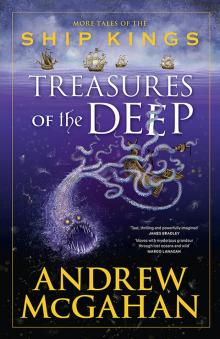 Treasures of the Deep
Treasures of the Deep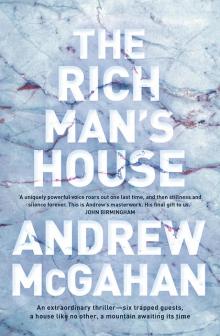 The Rich Man’s House
The Rich Man’s House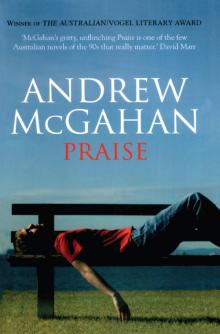 Praise
Praise The White Earth
The White Earth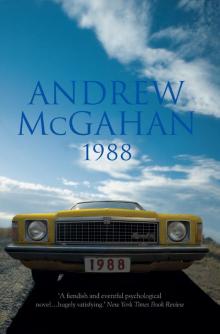 1988
1988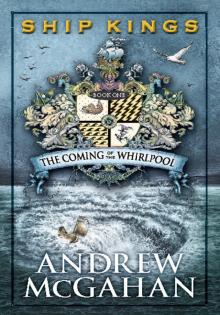 The Coming of the Whirlpool
The Coming of the Whirlpool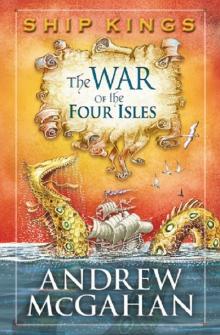 The War of the Four Isles
The War of the Four Isles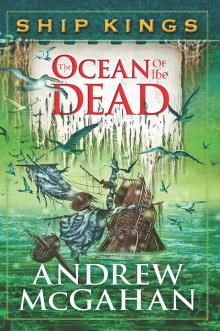 The Ocean of the Dead: Ship Kings 4
The Ocean of the Dead: Ship Kings 4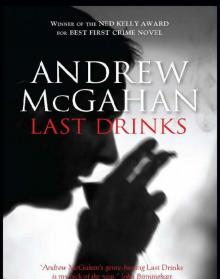 Last Drinks
Last Drinks Wonders of a Godless World
Wonders of a Godless World Underground
Underground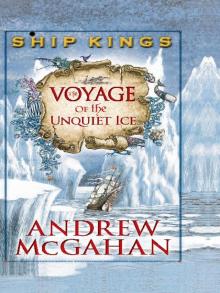 The Voyage of the Unquiet Ice
The Voyage of the Unquiet Ice